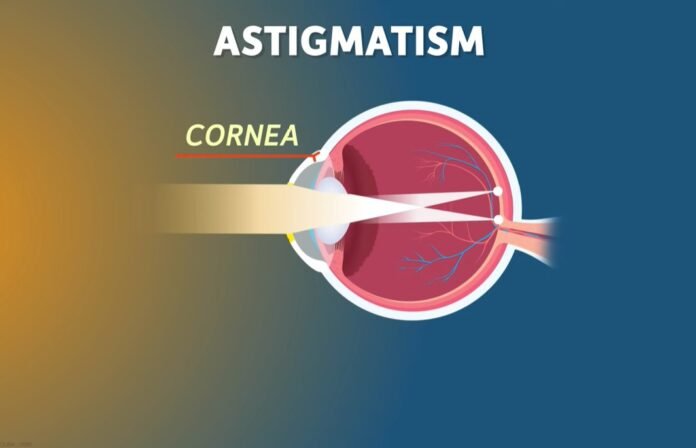Introduction
Astigmatism is a common eye defect caused by an imperfection in the cornea’s shape. Typically present at birth, astigmatism is a treatable condition. In this article, we will explore astigmatism eye defects in detail and discuss their types, causes, symptoms, and corrections.
What are Astigmatism Eye Defects?
Astigmatism is an eye defect that causes blurred vision. It is a common and mostly treatable condition. To understand it better, consider your eye as evenly rounded, like a basketball. People who have astigmatism do not have evenly-rounded eyes. Their eyes may be rugby-shaped.
Astigmatism eye defects occur when the cornea (the clear front part of the eye) or the lens inside the eye is not perfectly curved. Instead, it is irregular, causing light to focus unevenly on the retina. Astigmatism often comes with a combination of farsightedness and nearsightedness.
Causes of Astigmatism Eye Defects
The exact cause of astigmatism eye defects is not known. However, there are several possible situations which can cause it. Let us discuss them.
- Genetics: Astigmatism eye defects can be hereditary. While there are chances of it being present since birth, it can also develop later.
- Eye injury or eye surgery: Astigmatism can also happen after an eye injury. In some cases, it can also happen after eye surgery.
- Ageing: Our eyes change shape as we age. This may also develop astigmatism.
- Keratoconus: Keratoconus is a rare degenerative eye disease that leads to a change in the shape of our eyes. This disease can also lead to astigmatism.
Types of Astigmatism Eye Defects
There are three main types of astigmatism eye defects based on the curvature of the cornea. These are myopic, hyperopic, and mixed astigmatism. They can be further divided into regular and irregular astigmatism. Let us understand each of them.
Myopic Astigmatism
Myopic astigmatism occurs when one or both principal meridians (main curves) of the cornea are nearsighted. In simple terms, the cornea is curved too much. This leads to the meridians focusing the light in front of the retina instead of directly on it. Myopic astigmatism can affect distant vision.
Hyperopic Astigmatism
Hyperopic astigmatism happens when one or both principal meridians (main curves) of the cornea are farsighted, meaning the cornea is curved too little. The result is the opposite of myopic astigmatism. The curves focus the light behind the retina instead of directly on it, affecting near vision.
Mixed Astigmatism
In this type of astigmatism, one principal meridian of the cornea is nearsighted, while the other is farsighted. This results in blurry vision at all distances, whether far or near. Mixed astigmatism can also cause headaches and eye strain.
Regular Astigmatism
Regular astigmatism happens when the principal meridians are perpendicular to each other. In this type of astigmatism, the shape of the cornea is like that of a rugby ball. This causes light entering the eye to focus differently along the two meridians and causes blurry vision.
Irregular Astigmatism
Irregular astigmatism happens when the principal meridians are not perpendicular to each other. The cornea or lens is not smooth and has an irregular shape. This leads to an uneven focus of light on the retina.
Symptoms of Astigmatism
Astigmatism eye defects don’t have exact symptoms. Some people might have no symptoms. However, here are some of the commonly found symptoms.
- Headaches
- Eye strain
- Blurry, fuzzy, or distorted vision
- Facing problems seeing at night
Correction of Astigmatism
Astigmatism eye defects can be corrected through multiple methods. Here are some of them.
Eyeglasses or Corrective Lenses
This is the most common method of correcting astigmatism. The person with astigmatism has to wear eyeglasses or corrective lenses that correct their vision. However, this doesn’t change the shape of the eye. It merely helps in refocusing the light on the retina.
Refractive Surgery
Refractive surgeries, such as LASIK, Photorefractive keratectomy, or SMILE, are performed in cases of severe astigmatism. All these surgeries use a laser to change the shape of the cornea.
Ortho-K
Ortho-K, or Orthokeratology, involves wearing rigid contact lenses to correct the cornea’s curvature. Under this treatment, the person does not have to always wear the lenses. However, the correction is only temporary. Once they stop using the contact lenses, the vision also returns to the previous position.
Recommended Articles:
Best Various Apps For Physics and Its Information
Archimedes Principle an Overview and facts
Aristotle Fallacy : Law Of Motion
Artificial Transmutation: History, Types, Works and Applications
Asteroid and Comet Difference
No, this is a myth. Reading in low light can cause your eyes to work harder to focus, but it doesn’t cause astigmatism. No, it is not possible to prevent astigmatism. The best one can do is get their vision checked regularly. The principal meridians are the two main curves of the cornea. These curves are perpendicular and have the steepest and flattest curvatures. In a normal cornea, these curves are perpendicular and form a cross shape. A comprehensive eye exam can diagnose astigmatism. This includes a visual acuity test, refraction test, and keratometry. Refractive error is an eye condition that occurs when the eye cannot focus light correctly onto the retina. This can lead to blurry or distorted vision, depending on the type and severity of the refractive error. The curvature is evenly misshaped in regular astigmatism, while in irregular astigmatism, the eye has an uneven curvature. Astigmatism Eye Defects FAQs
Can reading in dim lights cause astigmatism?
Is astigmatism preventable?
What are the principal meridians?
How is astigmatism diagnosed?
What is the meaning of refractive error?
What is the difference between regular and irregular astigmatism eye defects?
